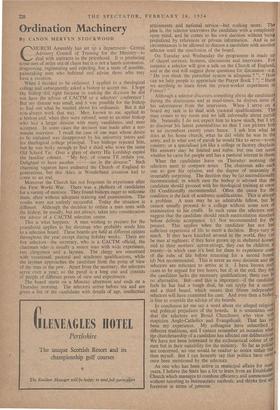Ordination Machinery
When I decided to be ordained, I applied to a theological college and subsequently asked a bishop to accept me. I hope the bishop did right because in making the decision he did not have the advice of CACTM or a selectors' conference ! But my diocese was small, and it was possible for the bishop to find out what he wanted about his ordinands. But it did not, always work that way. Men, known to me. applied to a bishop and, when they were refused, went to another bishop who had a larger diocese with many candidates. and were accepted. In some cases the decision was made after a ten- minute interview. I recall the case of one man whose desire to be ordained was disapproved by his university tutors and his theological college principal. Two bishops rejected him, but he was lucky enough to find a third who wore the same Old School Tie. Over a glass of sherry His Lordship espied the familiar colours. " My boy, of course I'll ordain you.
Delighted to have another ian in the diocese." Such charming vagaries have endeared the Church of England to generations, but this Alice in Wonderland situation had to come to an end.
Moreover the Church has not forgotten its experience after the First World War. There was a plethora of candidates for a variety of motives. They found bishops eager to welcome them, often without adequate training and examination. The results were not entirely successful. Today the situation is different. Although the decision to ordain a man rests with the bishop, he usually, but not always, takes into consideration the advice of a CACTM selection centre.
This is what happens. A man wishing to prepare for the priesthood applies to his diocesan who probably sends him to a selection board. These boards are held at different centres throughout the year except during holiday weeks. There are five selectors--the secretary, who is a CACTM official, the chairman who is usually a senior man with wide experience, two clergymen and a layman. The clergy are concerned with vocational, pastoral and academic qualifications, while the layman approaches the candidate from the point of view of the man in the pew. Apart from the secretary, the selectors serve once a year; so the panel is a long one and consists of people of different points of view and experiences. On Tuesday and Wednesday the programme is made up of chapel services, lectures, discussions and interviews. For instance a selector will give a talk on the Church of England, and at the end will suggest three questions for discussion--e.g. " Do you think the parochial system is adequate ? "; " How can we help people to appreciate the Prayer Book ? "; " Have we anything to learn from the priest-worker experiment in France?
Although a selector discovers something about the candidates during the discussions and at meal-times, he derives most of his information from the interviews. When I serve on a board my task is to deal with pastoral qualifications. The man comes to my room and we talk informally about parish life. Naturally I do not expect him to know much, but I try to discover his latent potentialities so that I can picture him as an incumbent twenty years hence. I ask him what he does at his home church, what he did while he was in the army, and in what sort of parish he would like to serve—town, country, or a specialised job like a college or factory chaplain. His answers may be limited and naive, but one can sense whether he cares for people and has a pastoral interest in them.


































 Previous page
Previous page